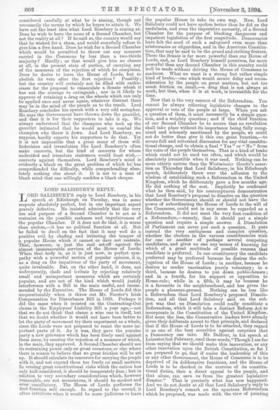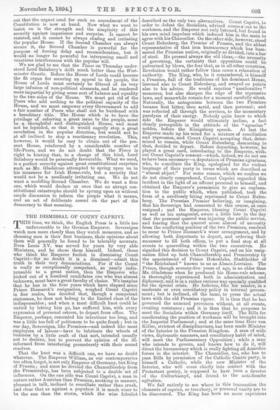LORD SALISBURY'S REPLY. L ORD SALISBURY'S reply to Lord Rosebery, in
his speech at Edinburgh on Tuesday, was in some respects absolutely perfect, but in one important aspect gravely defective. He insisted admirably that the very use and purpose of a Second Chamber is to act as a restraint on the possible rashness and impulsiveness of the popular Chamber. If it does not do that, it is worse than useless,—it has no political function at all. But he failed to dwell on the fact that it may well do a positive evil by chafing and irritating the temper of a popular House which it cannot or dare not restrain. That, however, is just the real set-off against the almost immeasurable services of the House of Lords. When that body is, as it is just now, in perfect sym- pathy with a powerful section of popular opinion, it is, as a drag on the impatience of the party of movement, quite invaluable. But, on the other hand, it does, not unfrequently, chafe and irritate by rejecting relatively small and unimportant measures which are certainly popular, and are not of the kind which would justify interference with a Bill in the main useful, and recom- mended by the Executive. The House of Lords did this unquestionably when it threw out Mr. Forster's Irish Compensation for Disturbance Bill in 1880. Perhaps it did the same when it insisted on the Contracting-Out clause in the Employers' Liability Bill a year ago,—not that we do not think that clause a wise one in itself, but that we doubt whether it would not have been better to let the party of movement try their experiment as a whole, since the Lords were not prepared to resist the more im- portant parts of it. As it was, they gave the popular party a new grievance which has been freely used against them since, by causing the rejection of a measure of which, in the main, they approved. A Second Chamber should use its restraining power only on great occasions, or else where there is reason to believe that no great friction will be set up. It should calculate its resources for carrying the people with it, and not expend them too freely on small matters. In vetoing great constitutional risks which the nation has only half-considered, it should be temperately firm ; but in relation to very secondary considerations which, however reasonable, are not momentous, it should be modest and even conciliatory. The House of Lords performs the first function well enough. In regard to the second, it often interferes when it would be more judicious to leave the popular House to take its own way. Now, Lord Salisbury could not have spoken better than he did on the usefulness, and even the imperative necessity, of a Second Chamber for the purpose of blocking dangerous and impatient legislation of the first magnitude. Democracies have felt the need of such a safeguard even more than aristocracies or oligarchies, and in the American Constitu- tion, that may be said to be the grand and striking feature. There the Senate is far more powerful than our House of Lords, and, as Lord Rosebery himself perceives, far more powerful than any Second Chamber in this country could well be made without driving the House of Commons to madness. What we want is a strong but rather simple kind of brake,—one which would secure delay and recon- sideration by the people on great matters, but not too much friction on small,—a drag that is not always at work, but that, when it is at work, is irresistible for the time.
Now that is the very essence of the Referendum. You cannot be always referring legislative changes to the approval or veto of the people at large. When you ask a question of them, it must necessarily be a simple ques- tion, and a weighty question; and if the chief function of our Second Chamber be to secure that no revolution shall take place without its importance being fully recog- nised and solemnly sanctioned by the people, we could not do better than give it this one great function,—to secure full and reiterated discussion for any vital constitu- tional change, and to obtain a final " Yes " or " No " from the voice of the people themselves. That is a kind of brake which could not be used too often, and which would be absolutely irresistible when it was used. Nothing can be more utterly untrue than the Westminster Gazette's asser- tion on Thursday that Lord Salisbury, in his Edinburgh speech, deliberately threw over the adhesion to the wisdom of establishing such a Referendum in the United Kingdom, which he deliberately gave a few months ago. He did nothing of the sort. Implicitly he confirmed what he then said, by his contemptuous demonstration that Lord Rosebery's proposal to dissolve on the question whether the Government should or should not have the power of subordinating the House of Lords to the will of the Commons, could not in any sense be regarded as a Referendum. It did not meet the very first condition of a Referendum,—namely, that it should put a simple question and require a simple answer. A Dissolution of Parliament can never put such a question. It puts instead the very ambiguous and complex question, whether the electors in the various constituencies wish for one or another of perhaps several competing candidates, and gives no one any means of knowing for which of a great multitude of possible reasons that candidate is preferred. In one constituency the candidate preferred may be preferred because he desires the sub- jugation of the House of Lords ; in. another, because he desires to render vaccination purely voluntary; in a third, because he desires to put down public-houses ; and. in a fourth, for hie support or opposition to Home-rule ; while in a fifth, it may be because he is a favourite in the neighbourhood, and has given the people a pleasure-ground. Nothing can be less like a Referendum than Lord Rosebery's proposed Dissolu- tion, and all that Lord Salisbury said on the sub- ject was that no Dissolution could really constitute a Referendum, which it will take a distinct Reform Act to incorporate in the Constitution of the United Kingdom. But none the less, the Conservative leaders have already given their deliberate assent to that principle, and declared that if the House of Lords is to be attacked, they regard it as one of the best securities against surprises that a Democracy can take. Mr. Balfour, in his speech at Leicester last February, used these words," Though I am far from saying that we should make this innovation, or any other innovation upon the British Constitution, so far I am prepared to go, that if under the leadership of this or any other Government, the House of Commons is to be deprived of its deliberative functions, and the House of Lords is to be checked in the exercise of its constitu- tional duties, then a direct appeal to the people, and that alone, can save us from the greatest legislative disaster." That is precisely what has now happened. And we do not doubt at all that Lord Salisbury's reply to Lord Rosebery's remark on the spurious Referendum which he proposed, was made with the view of pointing out that the urgent need for such an amendment of the Constitution is now at hand. Now what we want to insist on is the strength and the simplicity of this security against impatience and surprise. It cannot be resisted, and it cannot be always chafing and irritating the popular House. If the Second Chamber can always secure it, the Second Chamber is powerful for the purpose of forcing delay and reconsideration, but it would no longer be powerful for interposing small and vexatious interferences with the popular will. We are glad to see that the Times on Thursday under- stood Lord Salisbury's drift much better than the West- minster Gazette. Before the House of Lords could become the fit organ for securing an appeal to the people, the House of Lords must certainly be filtered of its very large infusion of non-political elements, and be rendered more impartial by giving some sort of balance and equality to the two sides of the House. We must get rid of the Peers who add nothing to the political capacity of the House, and we must empower every Government to add a fair number of Peers -who shall not be burdened with a hereditary title. The House which is to have the privilege of referring a great issue to the people, must be a thoughtful and distinguished House, and must not be lopsided, so that it would eagerly stop a great revolution in the popular direction, but would not be at all inclined to stop a reactionary revolution. This, however, it would be easy to obtain out of the pre- sent House, reinforced by a considerable number of life-Peers, and we do not doubt that the . Times is right in hinting that, to a change of this kind, Lord Salisbury would be personally favourable. What we need, is a perfect security against great constitutional surprises such as Mr. Gladstone attempted to spring upon us in his measures for Irish Home-rule, but a security that would not be a needlessly irritating one. We do not want a meddling Second Chamber. We do want a firm one, which would declare at once that no abrupt con- stitutional catastrophe should be sprung upon us without ample discussion to inform the people what it means, and an act of deliberate assent on the part of the democracy to that meaning.



















































 Previous page
Previous page